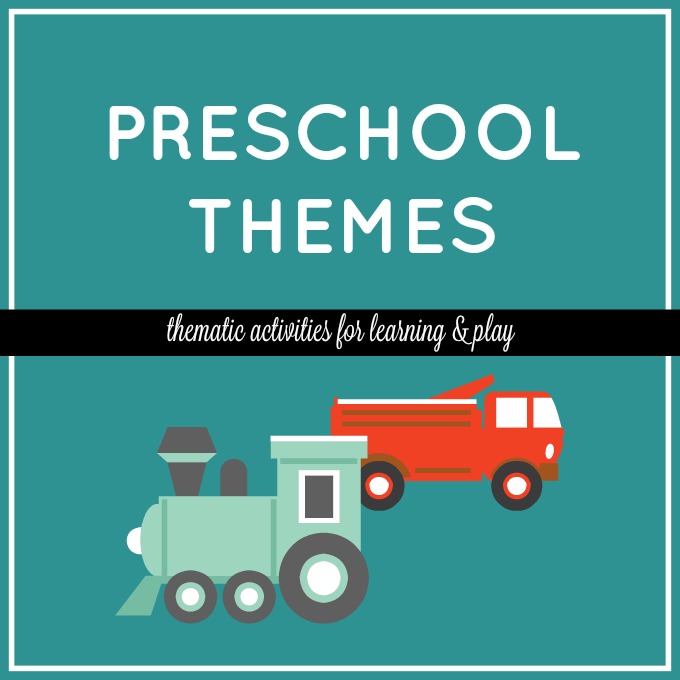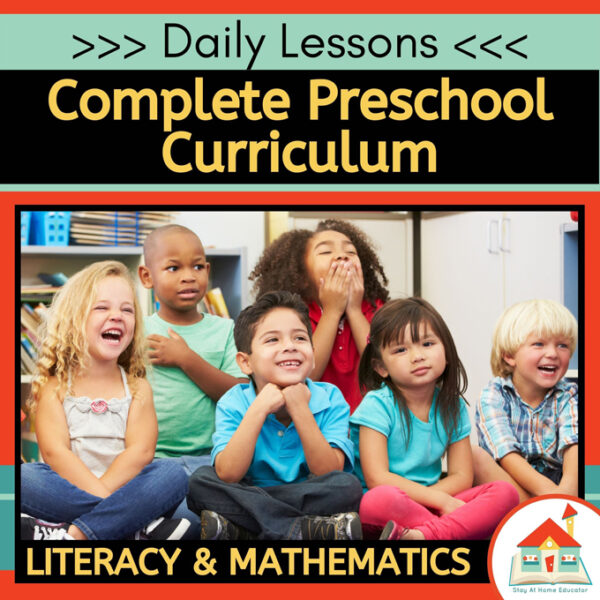Early childhood teachers can use preschool themes (thematic units) to engage children in the learning process by offering a variety of lessons and activities surrounding a common topic that is integrated into all content areas.
From art and music to math and pre-reading skills, thematic teaching provides a vessel for all the core subjects to be taught in an engaging and effective way.
Let’s explore preschool education themes. This page host all our preschool theme ideas!

This post may contain affiliate links, which means that at no cost to you, I may earn a small sum if you click through and make a purchase.
Preschool Theme Ideas
The possibilities are endless when it comes to choosing a theme for a preschool unit. Dinosaurs, winter, and farm themes are always popular, but you might be surprised at how much your preschoolers will love rocks, colors, or deserts, too.
Here is a list of our most popular preschool themes. Click on the link to be taken to the archives of activities and printables for preschool and kindergarten themed lessons.
Anytime Thems
- All About Me
- Animals
- Around the World
- Back to School
- Books
- Colors
- Construction
- Community Helpers
- Cooking & Baking
- Dinosaurs
- Fairy Tales
- Family & Pets
- Feelings & Emotions
- Fire Safety
- Five Senses
- Forest
- Friendship
- Music
- Names
- Robots
- Shapes
- Space
- Transportation
Holiday Themes
Spring Themes
Summer Themes
Fall Themes
Winter Themes
What is a Thematic Unit?
A thematic unit, in the context of preschool education, is a comprehensive teaching approach that integrates different subject areas such as math, reading, science, art, and social studies around a single topic.
The purpose of a thematic unit is to create connections and correlations between different content areas and make learning more meaningful and engaging for students.
Instead of learning preschool concepts in isolation, children can understand how different areas of knowledge interconnect in the real world through an integrated thematic unit.
This approach not only makes learning fun and interesting for preschoolers, but also helps children to relate what they learn to their own experiences, enhancing comprehension and retention.
Preschool Curriculum Themes
Are you now wondering how to pair curriculum theme ideas with foundational content?
The Complete Daily Lessons in Preschool Literacy & Math Curriculum has everything you need to teach your preschoolers literacy and math in a fun and engaging way, without all the boring worksheets!
The curriculum uses proven, systematic strategies to teach reading and math fundamentals. Use this curriculum as your base in preschool and then supplement with fun preschool thematic activities.
-
Product on sale
 * Daily Lessons in Preschool Literacy & Math CurriculumOriginal price was: $270.00.$121.50Current price is: $121.50.
* Daily Lessons in Preschool Literacy & Math CurriculumOriginal price was: $270.00.$121.50Current price is: $121.50.
How to Write Unit Themes for Preschool
When planning thematic units, teachers integrate literacy, science, social studies, math, music, fine motor and art all around the thematic topic.
The children’s culture and environment should be taken into consideration since in the preschool years sharing experiences and participating in shared experiences is an important part of learning. Ideas may arise from the children’s natural curiosity about a subject, such as dinosaurs or the weather, or themes can be created around topics of discussion that naturally arise in the classroom, such as pets, families, or the five senses.
The most successful preschool education theme units are those where the children can be involved in the planning stages and voice their questions. This gives them a sense of ownership and motivation to learn.
When inviting your preschoolers to help plan the next preschool theme, come prepared with a few popular ones to choose from based on what your students like. Once your students have helped you narrow the focus of learning, you can move forward with integrating the content areas.
Benefits of Thematic Units
Cross-curricular connections are only one of many benefits of thematic teaching. Planning preschool activities that are all theme based are also good for learning because of the following advantages.
- Increased Engagement: Themes that are relevant and interesting to children can increase their engagement in the learning process.
- Real World Connections: Thematic units allow for preschoolers get to experience the theme in multiple ways.
- Builds on Prior Knowledge: Preschools come to the classroom with a range of knowledge, and thematic teaching helps preschooler apply what they already know.
- Encourages Exploration and Discovery: Themes stimulate curiosity and encourage children to explore, investigate, and make discoveries.
- Improves Understanding: By connecting different areas of learning, thematic teaching helps children understand how things relate to each other in the real world.
- Boosts Retention: Children are more likely to remember what they have learned when the information is presented in a meaningful, interconnected way.
- Fosters Creativity: Thematic units often involve hands-on activities and projects, which promote creativity and problem-solving skills.
- Tailored Learning: Themes can be chosen based on children’s interests, making learning more personalized and enjoyable.
- Develops Critical Thinking Skills: By exploring a theme from various angles, children can develop their critical thinking and analytical skills.
- Builds Communication Skills: Discussing a common theme can improve children’s vocabulary and communication skills.

Drawbacks of Thematic Teaching
As with any method of teaching, there may be a few drawbacks. These might include:
- students may lose interest if the theme lasts too long
- students may miss connections if absent
- some themes may be less accessible to children based on culture
An Example of Preschool Education Themes Unit
This is a basic outline of what a thematic unit about plants might include:
- reading books about plants
- learning about the letter “p”
- discussions about caring for the earth and environment
- caring for plants by planting and tending a flower or garden
- observing and measuring a seed’s growth
- counting and sorting seeds
- comparing different types of plants on a nature walk
- singing songs about plants
- using flowers or twigs to paint, rather than traditional paint brushes
- exploring parts of a plant with a magnifying glass and science journal
Get Free Preschool Lesson Plan Themes
All the preschool learning activities are quick and easy to set up, designed to save time, requiring hardly any (if any at all) prep and only requiring the most basic of household materials. This makes them especially easy for parents to implement…and this makes preschool teachers especially happy, too!
Just glance over the lessons each day, gather the very few materials needed, and you’re ready to go!
